Are the channel’s iconic Founder/CEOs becoming bigger than the brands they built?
The names say it all. Walt Disney. Henry Ford. James Cash Penney. Iconic Founders and CEOs who came to personify the brands they led in the minds and hearts of their employees and the world. This phenomenon is perhaps even more prevalent in direct selling, where there is a long and storied tradition of charismatic leaders who have become synonymous with the companies they helm.

There’s no denying it. In our channel, the Founder/CEO is often a very powerful symbol—the person the field rallies around and gathers inspiration from; the keeper of the vision; the company’s driving force and undeniable figurehead. Having one person so closely associated with your brand presents both tremendous opportunities and challenges.
But what elevates a Founder/CEO to icon status? Is it unwavering vision and commitment? A charismatic persona? Passion for the products? A desire to provide stability, flexibility and opportunity for aspiring entrepreneurs? A combination of all of the above?
We recently spoke with several of the channel’s most impactful CEOs—some who founded their companies and others who have taken over for visionary leaders. We asked them for their thoughts on the role of the Founder/CEO in direct selling to discover how they balance being the face of the brand while safeguarding the brand itself.
Casting a Long Shadow
When asked what trait makes a leader iconic, the word charisma is often cited. And while a lot of energy has gone into examining the charisma behind influential leaders like Reese Witherspoon, Elon Musk and Richard Branson, charisma is an elusive term—and almost impossible to quantify.
Paul Adams of the Adams Resource Group has over 30 years of experience working closely with direct selling executives and understands the power and the pitfalls of charismatic leadership.
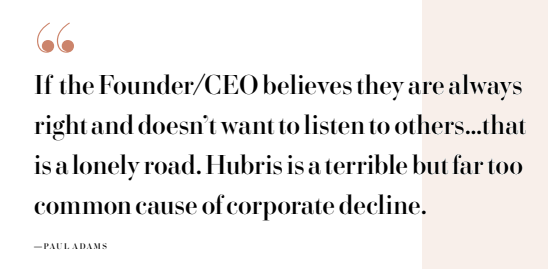
“I love folks with charisma who can paint a vision that people want to follow,” he shared. “I’ve seen many companies grow to amazing heights through brute force and charisma. But that will only carry you so far. There comes a time where they have to run a good company with a good team and sound fundamentals.”
It’s a sentiment echoed by Heather Chastain of Bridgehead Collective, a direct selling strategic consultancy. “The belief, conviction and passion of Founder/CEOs is a special kind of magic that inspires in ways that nothing else can. There’s a consistent authenticity that shows through in every aspect of the business.”
Bigger than the Brand?
Social media has undoubtedly contributed to the rise of the idea of Founder/CEO as influencer and celebrity. Consumers can now interact and get insights into the personal lives and beliefs of the CEOs they admire through Twitter and other social media channels. CEOs now have the power, means and platforms to instantly connect with their followers, turning them into passionate brand advocates and members of a larger community.
And in direct selling, it’s particularly important for the field to feel that connection with their CEO. Through conferences, incentive trips and social media posts, the field develops a relationship (real or perceived) with leadership that feels personal and full of expectations.
While the benefits of that kind of community and connection are powerful, there is also a risk of the CEO eclipsing the company in the field’s eyes.
It’s something that Jason Camper, Founder and CEO of Le-Vel, has been concerned about since Day One. “I never wanted Le-Vel to be about one person. I wanted it to be a community. You just don’t know what the future holds, so it needs to be about the mission, the culture and the impact you can have.”
The challenge is ensuring that the organization fosters and maintains a strong identity separate from that of its founder. “It’s vital that an organization have honest and open conversations about how the company positions the founder. From the very beginning, the role and voice of the founder should be something that’s used strategically,” urged Chastain. “This is critical for scalability during the initial growth phase. It’s imperative the company isn’t dominated by one person or personality.”
“Many companies have found a way to use a founder’s big persona AND build a great company at the same time,” added Adams. “If the Founder/CEO believes they are always right and doesn’t want to listen to others…that is a lonely road. Hubris is a terrible but far too common cause of corporate decline.”
Bottom line? Strong leadership trumps charisma.
Jack Fallon, Founder CEO of Total Life Changes (TLC), understands that while people relate to his underdog story of building a business against all odds and find inspiration in his persistence and perseverance, ultimately the field and customers are motivated primarily by the products.
“The products create the success stories,” he explained. “It’s not my company. I founded it, sure—but it is the energy and ability of others to promote their success stories that carry TLC. I will never become bigger than the brand. That’s not even a consideration or concern for me.”
Fa Park, Founder and CEO of Color Street noted a simple solution that works for his company. “When we keep our products, innovation and manufacturing capabilities front and center, there is no risk that I become bigger than the brand.”
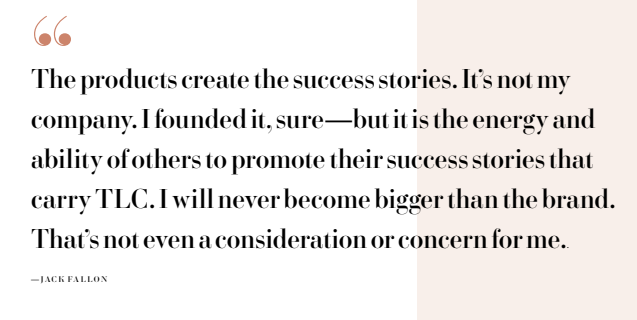
While the concerns are valid and precautions are important, being the face of the company is not something that confident leaders shy away from. “We don’t really see any drawback to being the face of 4Life,” said Co-Founder Bianca Lisonbee who created the company with her husband David. “But it does place a big responsibility on us to be a good example in all that we do. And anything that can remind or motivate us to be the best version of ourselves is a good thing.”
Inspiring the Field
There is a an undeniably special relationship between the CEO and field in direct selling. It’s a relationship that across the board the channel’s most iconic CEOs nurture through transparency and respect. The field must believe and share in the founder’s vision, and by cultivating strong sense of partnership and open communication, iconic CEOs can effectively lead the field through the peaks and valleys of the business.
“Is having a heathly relationship with the field important? It’s like asking if it’s important to have a healthy relationship with your spouse,” shared Camper. “It’s super critical. It’s beyond critical. When there’s a problem and you try to sweep it under the rug—that’s when people get frustrated. I think we have a healthy balance of what we share with the field and what the field shares with us.”
Katy Holt-Larsen, Kyäni’s CEO, agreed. “We call our field business partners, because we see them as such. We are vested in each other’s success, and this requires a relationship created by listening, understanding and building together.”
For Market America Worldwide | SHOP.COM’s Founder and CEO JR Ridinger, the reciprocal nature of the relationship between field and leader cannot be underestimated. “The greatest benefit of leading Market America is having the opportunity to share such a powerful entrepreneurial business with people all around the world. Our business isn’t about figureheads and CEOs. It’s about enabling people to achieve their personal and financial goals. It’s about leading by example and succeeding so other people can realize their dreams. It’s really about their achievements—not mine.”
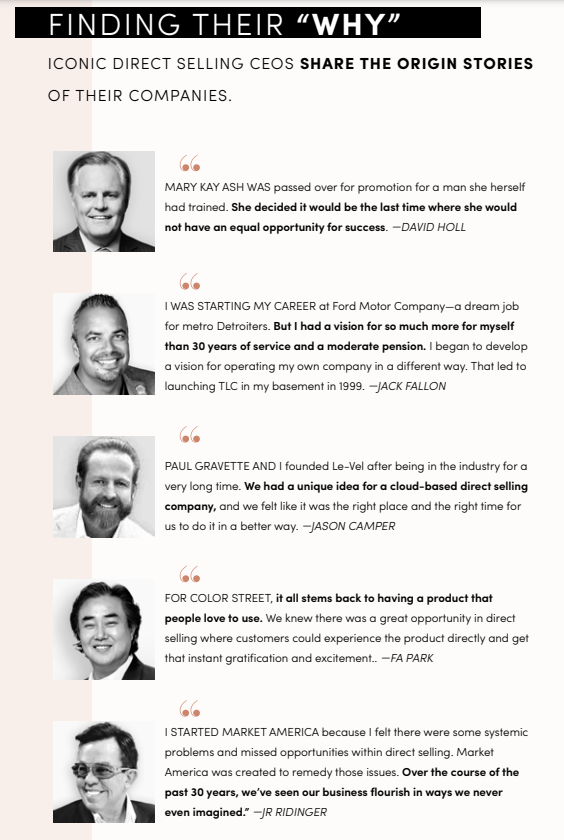
For Park, constantly building that belief is a primary responsibility of his role as CEO. “Our field knows that when I talk about having hopes; believing in what you have to offer; building a business one person at a time—they know it comes from my personal experience. I didn’t give up on my dream for Color Street, and I encourage them to not give up on theirs.”
Building on Powerful Legacies
But what happens to the organization when these iconic leaders are no longer a part of the company and can no longer fulfill the role of champion and cheerleader for the brand? How can their successors make the role their own without losing the founder’s vision? And how do they gain and retain the trust and confidence of the field when the person most closely associated with the mission, purpose and success of a brand is no longer there to serve as inspiration?
The challenge is certainly not unique to direct selling. Many brands have found ways to successfully leverage their leader’s legacy and incorporate it into their positioning and branding. Even though Colonel Sanders has been deceased for decades, his likeness remains the center of Kentucky Fried Chicken. And most consumers can’t think of Apple without also thinking about Steve Jobs.
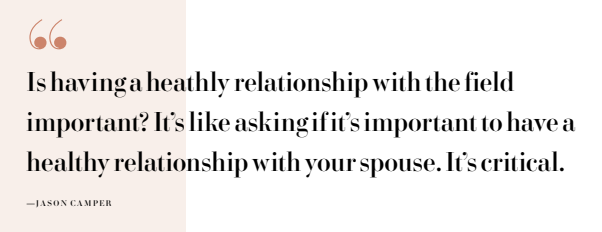
This same premise is demonstrated throughout direct selling. Mary Kay, Young Living and Kyäni have endured the loss of a dynamic Founder/CEO. Each of these companies have kept the founder’s mission at the heart of the company, but moved the company forward with a vision that both honors and evolves that of the founder.
Perhaps no company in or outside the channel is more closely identified with one person as Mary Kay. The company will mark its 60th anniversary next year, and it has kept Founder Mary Kay Ash as it guiding light and touchstone since her death in 2001.
As David Holl, Mary Kay’s Chairman and CEO explained, “When Mary Kay Ash is the person associated with your brand, you want to emphasize that. Her legacy and leadership cemented her as one of the world’s most-renowned transformational leaders. Perhaps no other woman has played a more important role in the advancement of women entrepreneurs.”
It only makes sense to keep that legacy at the center of the brand and the heart of today’s leadership at the family-owned company. Her vision was to empower women to have economic opportunities, which is just as powerful and meaningful today as it was in 1963. “We have a clear line of sight knowing we are here to support the independent sales force,” said Holl. “It’s important to remember why we are here and who we are here to support. Her legacy is something we aspire to honor and challenge ourselves to look up to every day.”
Young Living faced a similar challenge with the loss of their Founder and CEO D. Gary Young in 2018. He founded the company with his wife Mary, who has taken up the helm as CEO since his death. The company was built on a foundation of helping others achieve their dreams through the freedom of health and well-being, and Gary’s personal story about the healing power of essential oils inspires more than 6 million distributors and customers across 155 countries around the globe.
But the dream for Young Living did not belong to Gary alone. Mary was first introduced to direct sales in 1985. The knowledge, experience and hands-on approach she learned all those years ago still influences her leadership style. As a female CEO running one of the largest direct selling companies in this industry, Mary’s keen, human-focused business instincts play an active role in elevating the mission of the organization worldwide.
“I strive to make decisions that keep the integrity of who we are and our mission intact as we expand forward into the next chapter of Young Living,” she shared. “Gary planted the seeds of our roots for the powerful foundation that we have today from which we spread our wings to carry our vision to new heights achieving the destiny that has always been ours; touching the hearts and souls of humanity as educators of nature’s living energy—essential oils.”
Perpetuating Gary’s vision remains the heart of Mary’s vision, and she continues to direct considerable time and energy into the D. Gary Young, Young Living Foundation. In just the last five years, the foundation has impacted nearly one million lives.
When an unthinkable tragedy permanently altered the trajectory of Kyäni in the form of a plane crash in 2019 that took the lives of two of the company’s founders, the remaining leadership team immediately stepped in to provide the stability the company needed to navigate incredibly complicated waters.
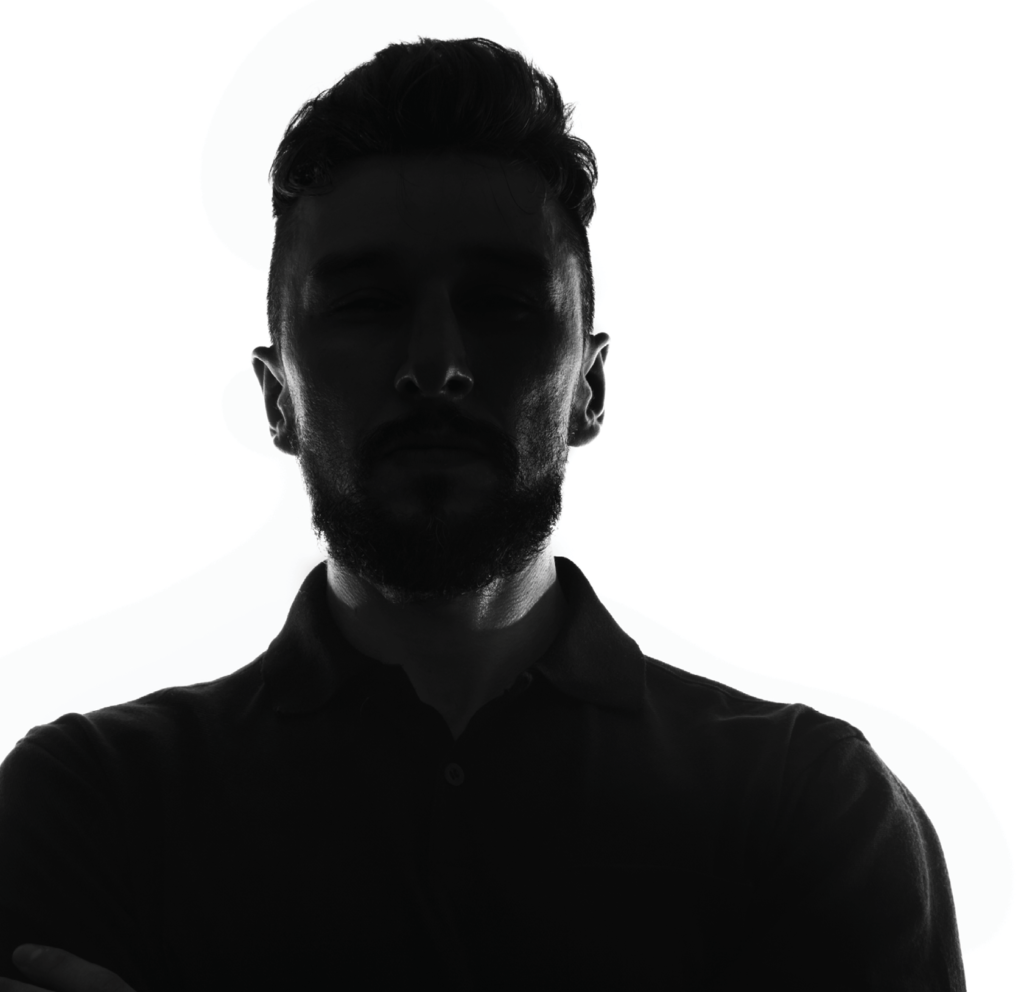
After the loss of Kirk and Jim Hansen, Carl Taylor, another Founder, took the helm in the immediate aftermath with the help of a solid leadership team to help keep the company’s vision, mission, message and purpose afloat.
Current CEO Katy Holt-Larsen joined the company one year after the tragedy and found instant inspiration from those lost and those left behind. As she explained, “It was the founders’ vision and legacy that drew me to Kyäni. When you think about the word ‘founder,’ it is derived from ‘foundation.’ The Hansens and the Taylors laid a strong foundation for the company, and everything I do to help Kyäni grow is grounded in those principles.”
The experience has shaped Larsen’s approach to leadership. “When I came on, people were undoubtedly still feeling the loss of these men, but the company itself was still moving forward. It really speaks to the vision and leadership of all of our founders that Kyäni was able to not just survive a crisis like that, but continue to thrive. Two-plus years down the road we’re making significant personal and financial investments in our future, driving the business forward; working super hard; and enjoying a lot of success.”
Securing a Smooth Transition
While these stories of sudden leadership changes are dramatic, thankfully they are not the norm. And every successful direct selling company will ultimately pass the baton from the Founder/CEO to the next generation of leadership.
Many factors go in to the decision of how to ensure minimal disruption when a founder plans to retire or leave the business. Health of the business; current trajectory; and future positioning all come into play. Chastain noted that this can often be an excellent time to gently and respectively signal a new direction for the brand. “As with most things, you can’t go wrong if you are kind, respectful and clear in your communication, regardess of the degree of change.”
Adams feels the smoothness of the transition depends upon the key principles and beliefs at the heart of the company. “We believe in building companies around key principles. If we hire and train based on those principles, a company can continue to thrive, regardless of who the current leader is.”
4Life’s David and Bianca Lisonbee have always had a clear vision of how important surrounding themselves with other capable leaders is to the longevity of the business. “There’s no doubt that a founder’s role is unique in terms of cultivating a corporate culture and shaping the fundamental tenets of a brand,” David shared. “However, stewardship must engender a humility that attracts leaders in all levels of management. We enjoy the support of very talented senior-level colleagues with long-term tenures. Danny Lee, 4Life President and CEO, drives each of them to grow and elaborate upon the brand, knowing that they understand our vision.”
A Position Like No Other
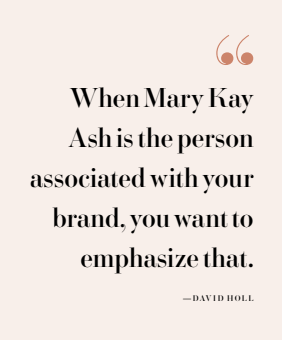
The role of CEO in any organization is complicated. It involves being a good leader of course. But it also requires being a good listener. They must be truly passionate about the products, and they must be fiercely protective of the people and institution they lead.
It requires great personal charisma, unwavering vision and commitment and willingness to collaborate with their corporate office and their field. It’s not an easy job—but, according to the channel’s key players, it is ultimately a rewarding one.
“Whether it’s the products or our leadership, I never get away from people telling me how much Le-Vel changed their life,” Camper said.
So while these are positions of power and influence, the leaders are also careful to note that, at the end of the day, the company is more important than any one person—even the Founder. As Bianca Lisonbee succinctly explained, “The brand itself is bigger than any one of us because its success includes so many of us.”
Three Key Takeaways
1 / The role of Founder/CEO as celebrity and influencer is expanding
In direct selling, social media, events and incentive trips gives the field easy access and an unprecedented personal connection to the Founder/CEO.
2 / The relationship between Founder/CEO and the field is essential
Distributors must believe in the vision and leadership of the Founder/CEO—cultivating close personal bonds with the field builds belief.
3 / Passing the baton can launch the brand in a positive new direction
While the Founder/CEO is a powerful figure and asset, new leadership can subtly shift the company in an intriguing way.
From the July 2022 issue of Direct Selling News magazine.


